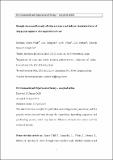Por favor, use este identificador para citar o enlazar a este item:
http://hdl.handle.net/10261/181281COMPARTIR / EXPORTAR:
 SHARE
BASE SHARE
BASE
|
|
| Visualizar otros formatos: MARC | Dublin Core | RDF | ORE | MODS | METS | DIDL | DATACITE | |

| Título: | Drought stress modifies early effective resistance and induced chemical defences of Aleppo pine against a chewing insect herbivore |
Autor: | Suárez-Vidal, Estefanía CSIC ORCID; Sampedro Pérez, Luis CSIC ORCID; Voltas, Jordi; Serrano, Luis; Notivol, E.; Zas Arregui, Rafael CSIC ORCID | Palabras clave: | Carbon economy Chemical defences Drought stress Hylobius abietis Pest resistance Pinus halepensis |
Fecha de publicación: | 3-abr-2019 | Editor: | Elsevier | Citación: | Environmental and Experimental Botany 162: 550-559 (2019) | Resumen: | During their long lifespan, pines must cope with simultaneous abiotic and biotic stresses such as drought andherbivory. Mediterranean pines are isohydric species that rapidly close their stomata in response to droughtreducing carbonfixation. In such situations, the synthesis of chemical defences could be impaired. Here, wetested the hypothesis that drought stress may constrain the capability of Mediterranean pines to defend againstherbivory and to induce chemical defences. For this purpose, we subjected three contrasting populations ofAleppo pine (Pinus halepensisMill.) to three levels of drought stress, thereafter exposing the seedlings to theherbivoreHylobius abietisL. A suite of ecophysiological and defensive traits was measured to explore the in-teraction between both stresses. Drought significantly affected the13C signature and reduced starch and fatty acids concentration. Damagecaused by the insect was affected by drought stress, being 75% higher at the moderate stress level but returningunder severe stress to similar values as control seedlings. Seedlings responded to herbivory by decreasing theconcentration of total polyphenolics and condensed tannins, increasing the concentration of total diterpenes, andmodifying the profile of major terpenes. Induced responses to herbivory were, as expected, altered by drought.Inducibility of polyphenolics decreased as drought stress increased while for diterpenes it was higher at mod-erate stress. Moreover, a significant drought × herbivory interaction was found on the multivariate terpeneprofile.These results should be considered for predicting responses of pine forests to the forecasted increase of abioticand biotic risks associated with global change. | Descripción: | 51 páginas | Versión del editor: | http://dx.doi.org/10.1016/j.envexpbot.2019.04.002 | URI: | http://hdl.handle.net/10261/181281 | E-ISSN: | 0098-8472 |
| Aparece en las colecciones: | (MBG) Artículos |
Ficheros en este ítem:
| Fichero | Descripción | Tamaño | Formato | |
|---|---|---|---|---|
| Suarez_Drought_stress...pdf | 1,59 MB | Adobe PDF |  Visualizar/Abrir |
CORE Recommender
Page view(s)
224
checked on 23-abr-2024
Download(s)
88
checked on 23-abr-2024
Google ScholarTM
Check
NOTA: Los ítems de Digital.CSIC están protegidos por copyright, con todos los derechos reservados, a menos que se indique lo contrario.
